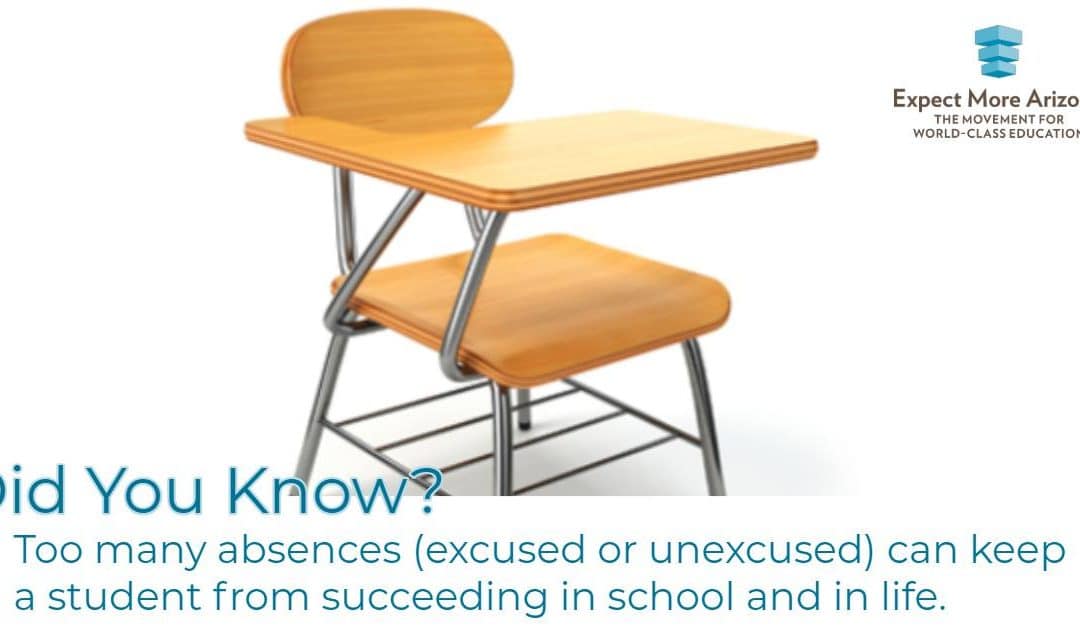By Expect More Arizona
Showing up for school has a huge impact on a student’s academic success starting in kindergarten and continuing through high school. Even as children grow older and more independent, families play a key role in making sure students get to school safely every day and understand why attendance is so important for success in school and on the job.
DID YOU KNOW?
- Starting in kindergarten, too many absences can cause children to fall behind in school.
- In kindergarten, missing even 10 percent (approximately 18 days) of school can make it harder to learn to read.
- By 6th grade, absenteeism is one of three signs that a student may drop out of high school.
- By 9th grade, regular and high attendance is a better predictor of graduation rates than 8th grade test scores.
- Absences can affect the whole classroom if the teacher has to slow down learning to help children catch up.
- Being late to school may lead to poor attendance.
- Students should miss no more than 9 days of school each year to stay engaged, successful and on track.
- Absences can be a sign that a student is losing interest in school, struggling with school work, dealing with a bully or facing some other potentially serious difficulty.
- Students can be chronically absent even if they only miss a day or two every few weeks.
- Attendance is an important life skill that will help your child graduate from college and keep a job.
WHAT YOU CAN DO (Parents of children in K – 5th grade)
- Set a regular bed time and morning routine.
- Lay out clothes and back packs the night before.
- Make sure your child has the required shots/vaccinations before the first day of school.
- Don’t let your child stay home unless she is truly sick. Keep in mind complaints of a stomach ache or headache can be a sign of anxiety and not a reason to stay home.
- If you child seems anxious about going to school, talk to teachers, school counselors or other parents for advice about making her more comfortable and excited about learning.
- Develop back-up plans for getting to school if something comes up. Call on a family member, neighbor or other parent.
- Avoid medical appointments and extended trips when school is in session.
WHAT YOU CAN DO (Parents of children in 6th-12th grade)
- Make school attendance a priority.
- Talk about the importance of showing up to school every day, make that the expectation.
- Help your child maintain daily routines, such as finishing homework and getting a good night’s sleep.
- Try not to schedule dental and medical appointments during the school day.
- Don’t let your child stay home unless truly sick. Complaints of headaches or stomach aches may be signs of anxiety.
HELP YOUR TEEN STAY ENGAGED
- Find out if your child feels engaged by his classes and feels safe from bullies and other threats. Make sure he/she is not missing class because of behavioral issues and school discipline policies. If any of these are problems, work with your school.
- Stay on top of academic progress and seek help from teachers or tutors if necessary. Make sure teachers know how to contact you.
- Stay on top of your child’s social contacts. Peer pressure can lead to skipping school, while students without many friends can feel isolated.
- Encourage meaningful afterschool activities, including sports and clubs.
COMMUNICATE WITH THE SCHOOL
- Know the school’s attendance policy – incentives and penalties
- Talk to teachers if you notice sudden changes in behavior. These could be tied to something going on at school.
- Check on your child’s attendance to be sure absences are not piling up.
- Ask for help from school officials, afterschool programs, other parents or community agencies if you’re having trouble getting your child to school.
© Reach Out and Read, Inc.
For more information and to stay update on education in Arizona visit: http://www.expectmorearizona.org





